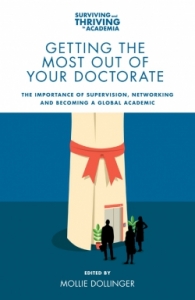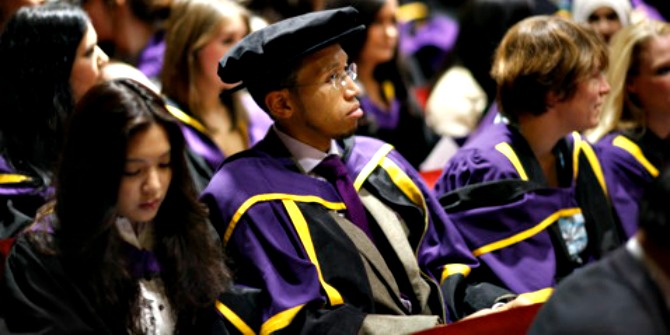In Getting the Most out of Your Doctorate: The Importance of Supervision, Networking and Becoming a Global Academic, editor Mollie Dollinger brings together commentary and analysis from an international group of students and scholars to offer reflections on the doctoral researcher’s journey through a PhD programme. This is a smart, handy and pragmatic contribution to any doctoral student’s bookshelf, writes Sabrina Wilkinson, and may also be of help to supervisors looking to get a fresh perspective on the contemporary student’s needs.
Getting the Most out of Your Doctorate: The Importance of Supervision, Networking and Becoming a Global Academic. Mollie Dollinger (ed.). Emerald Publishing. 2019.
 Find this book (affiliate link):
Find this book (affiliate link): ![]()
The first few weeks of the doctoral student experience can be daunting, to say the least. Orientation programmes outline unfamiliar expectations predicated on, for most, an alarming amount of personal discipline and accountability. At the same time, many spend this period getting used to a new supervisor, institution and city. Questions about how to negotiate these novel environments and colleagues, and how to structure the expanse of time ahead, are often regular. Getting the Most out of Your Doctorate: The Importance of Supervision, Networking and Becoming a Global Academic, edited by Mollie Dollinger, is a smart and handy guide for those grappling with these concerns and others. Drawing together commentary and analysis from an international group of students and scholars, this book will be valuable to those considering or already pursuing doctoral studies. It will also be of help to supervisors, who may learn a few things about their mentorship style and get a fresh perspective on the contemporary student’s needs.
Structured roughly chronologically along a doctoral researcher’s journey through a PhD programme, the book is broken up into three sections: preparation; mediating; and understanding your place. (The reader may find the most relevant chapters to be those that pertain to their respective stage of the process.) Chapters within each of these sections use accessible prose and personal stories to advise and warn. This is a quick read, but certainly not one lacking in tangible take-aways. Preparation, the first section, is centred on the notion of supervision. This is a good place to start because the supervisorial relationship is, of course, at the heart of any successful doctoral experience. Samantha Marangell, Lilia Mantai and Dollinger helpfully draws out distinctions between the various ‘extreme’ supervisorial styles (the micro-manager, the passive-aggressive and the laissez-faire extremist) and cautions those who may clash with these approaches. Later, Dely Lazarte Elliot, Rui He and Dangeni’s chapter takes a unique approach by including student and supervisor reflections on three scenarios common to the PhD experience, most notably an important discussion on ways to mitigate feelings of isolation in the research process.
The second section follows with a discussion of mediation, including the roles of community and networking. Chapter Five, ‘The Power of an Effective Community in Creating Networked Researchers: Outcomes Beyond a Thesis’, will be of particular interest to those with a desire to learn more about how to develop constructive communities within their own institutions, and better understand the value these venues provide participants. As authors Kerry Bissaker et al write: ‘creating a strong community needs cultivation […] and laying a foundation through early and sustained engagement proved of value to developing deeper insight into group members’ (71). In the subsequent chapter, ‘Developing Networks Near and Far’, the need to foster social and professional contacts during the doctoral experience is addressed. Challenges to success in this area are laid out, including cultural differences and power imbalances, and thoughtful direction is provided on how to mitigate these difficulties. Amongst other tips, authors Jenna Mittelmeier et al suggest that students should remain candid with their supervisors, attend departmental events and use social media to connect informally with other emerging scholars.
The book closes with a focus on the notion of the modern, global doctoral student and, subsequent, academic. This is an important section in large part because it acknowledges some of the positive (and negative) realities of twenty-first-century academia. Tenure-track jobs are scarce and the need for PhD researchers to be entrepreneurial and strategic in their research activities and profile is, unfortunately, real. (The book broadly does a good job of highlighting the opportunities for graduates outside the ivory tower.)
Uwe Brandenburg offers up some engaging commentary on how doctoral students can ‘internationalize’ their studies in such ways as studying or taking a semester abroad or opting for an intercultural methodology that can open up new ways of knowing. In a manner that may be slightly disconcerting for those who have opted for a domestic programme and thought little about the need to ‘globalise’ their research, the contributor suggests: ‘you cannot do a relevant and good PhD without an international component of some kind’ (114). Later, ‘Succeeding Beyond your Doctorate: The Importance of Identity, Industry Awareness and Decisive Action’ takes up a parallel refrain, highlighting the skills researchers driven to succeed in the academy, and outside of it, should hone. The notions of transferable skills and value propositions are central to this chapter. ‘One cannot underestimate the value of developing a clear sense of one’s self, one’s impact to the chosen workforce and to society more generally’ (129), Shelley Kinash and Madelaine-Marie Judd write.
Despite the certain practicality of this text, there are a few perspectives that might be underplayed in its contribution. While undoubtedly the end goal for most doctoral students is a stable and fulfilling career, the PhD journey itself should be independently valued for its capacity to provoke new questions and learnings, foster personal self-worth and allow those who opt for this path the space and freedom to follow their intellectual passions. Certainly, building professional relationships that might lead to opportunities down the line is important, as is learning a new language or technical skill, but there should also be room for doctoral researchers to engage in pursuits with no foreseeable bearing on their career or to study research topics that may not be exceptionally marketable or trendy. This is not to say that this book doesn’t acknowledge these aspects of the PhD practice. Indeed, there are a number of instances where contributors point out the intellectual stimulation that makes this experience, for many, such an enriching period. Yet, it is a suggestion that at times this viewpoint is overshadowed by the collection’s emphasis on leveraging profile and career prospects.
The book could also more clearly draw out the distinctions between programmes in different countries. A PhD in the US, for instance, is generally much longer in length than one pursued in the UK. Typically, this is because US programmes involve two years of courses and comprehensive exams, whereas modules are often optional and comprehensives mostly unheard of in the UK. What are the implications of these diverging systems, and others, for PhD students, particularly with respect to their relationships with their cohort and supervisor? And how do they change the pace and progress of the experience? While the book at times briefly touches on such differences, these are questions that are largely left unanswered in this contribution.
Notwithstanding these criticisms, this book is a pragmatic contribution to any doctoral student’s bookshelf. At the end of the day, a doctoral degree is a research and a professional endeavour and, in an increasingly competitive market, PhD students must do what they can to find ways to set themselves apart from the crowd. This compact volume helps them do just that.
Note: This review gives the views of the author, and not the position of the LSE Review of Books blog, or of the London School of Economics. The LSE RB blog may receive a small commission if you choose to make a purchase through the above Amazon affiliate link. This is entirely independent of the coverage of the book on LSE Review of Books.
Image Credit: (MD Duran CCO).









1 Comments